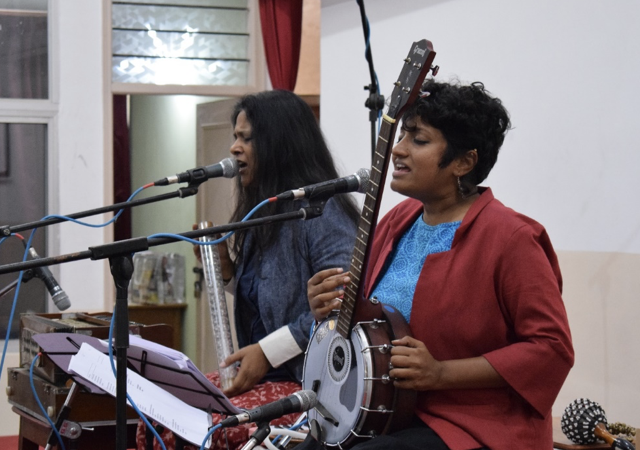DAY 3 : 09 February 2020
11.15 – 12.15 pm
Cultural Programme: The Threshold
Singer and actor M D Pallavi and National Award-winning singer-composer Bindhu Malini presented Threshold, a musical conversation that examines gender through stories of women across continents and generations.
The artistes were introduced by Rehmat Merchant.

The performance celebrated the struggles of women through the ages, in different parts of the world, through a musical narrative. The musician duo, who have been performing the evolving compilation of The Threshold in front of diverse audience, had trimmed the customary 90-minute performance to about 60 minutes to accommodate the schedule of the NWMI meeting. The hour-long musical journey highlighted stories of women across centuries and civilizations who had defied the stereotypes of their times to stand up and speak out, even though many of their struggles ended in tragedy and most were unrecognised for years afterwards.
The performance began with a traditional song of lament from Tamil Nadu, with women coming together to mourn the fate of the unborn child if it is a girl. The prejudices faced by the girl child right from childhood were narrated through poetry that flowed seamlessly along with the songs, drawn from different genres, continents and generations.
During the performance, the duo spoke of many unsung and forgotten women of the past, such as Maria Anna Mozart, the sister of the legendary composer, Wolfgang Amadeus Mozart, who could not pursue a musical career due to her gender. Presenting a piece by Fanny Mendelssohn, Pallavi and Bindhu talked about how Fanny was not able to publish her work under her own name for a long time and had to use her brother Felix’s name. The duo also presented the tumultuous lives of many women of the past, including Moroccan singer and activist Kharboucha, Greek mathematician, astronomer and philosopher Hypatia, and the first female physician of Athens, Agnodice.
The struggles of women of India were also highlighted, including the social censure of Sule Sankavva, whose poems were banned because she was a courtesan, and Nangeli, who fought the ‘breast toll’ imposed on women belonging to the so-called lower castes in Kerala.
While most of the tales were of women of many centuries past, Pallavi and Bindhu Malini narrated stories about fighting gender discrimination in the recent past, too. They talked about Puerto Rican labour leader Luisa Capetillo, who was taken to court in 1919 for wearing pants. Nearer home, they also told the story of the over two decades of activism that finally allowed women to perform ‘aradhana’ at the Thyagaraja Aradhana in Tamil Nadu in 1941, and described how the struggles of under-privileged women in south India continue. Compositions of Lingamma, Neelamma, Goggavva, Meerabai and Nina Simone are used to present these stories of struggle for gender equality.
Besides presenting the songs and poems and offering narratives and contexts, the paid of musicians also play a number of instruments to reach out to the audience even more effectively. All the lyrics were not understood by everyone in the audience, but language is not a barrier for music, especially when it is used to put forward struggles against gender discrimination. The universality of music and the theme of the performance were evident when the spell-bound audience of over 100 media women from across the country gave a standing ovation to the two performers when they concluded their musical journey through time.


